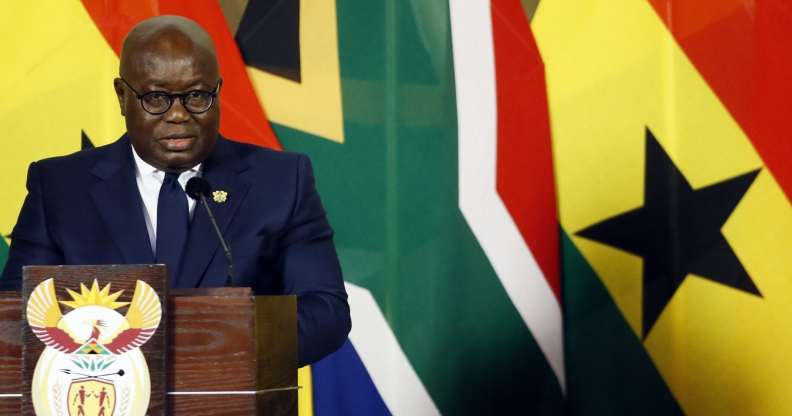President of Ghana ‘reassures’ church leaders that he won’t decriminalise homosexuality

Ghana President Nana Akufo-Addo (PHILL MAGAKOE/AFP/Getty)
The President of Ghana has said he has “no plans” to change the country’s laws on homosexuality.
It is currently illegal to be gay in Ghana, and gay men can face up to three years in prison. Human rights groups say that physical and violent homophobic attacks against LGBT people are still common, often encouraged by the media and religious leaders.
President Nana Akufo-Addo, who became the country’s President in January, had claimed earlier this year that the country is bound to eventually decriminalise homosexuality.

Ghana’s President Nana Akufo-Addo (DANIEL LEAL-OLIVAS/AFP/Getty)
He claimed “it is something that is bound to happen,” and that “like elsewhere in the world, the activities of individuals and groups [will lead to change].”
However in a speech to the 2018 Synod of the Global Evangelical Church on Thursday, the leader insisted he would not support change.
Rt. Rev Setorwu Kwadzo Ofori, the Moderator of the Global Evangelical Church, had pressed him to make clear that he would resist any international pressure to abolish the law.
In his speech, Akufo-Addo said:: “The Church and the Government have to work together since we have the same aim. There should be no doubt in anybody’s mind that the men of God have the moral authority to hold the political leadership to scrutiny.
“It is important that we do not debase the principles we purport to uphold.”
He added: “I do not hesitate to state openly that I am a Christian in politics, and will continue to be so, a politician who is deeply influenced by Christian values… let us join hands together and build the happy and prosperous Ghana we all want. It is well within our reach.
“And, let me assure that this Government has no plans to change the law on same-sex marriage. We have no authority, and we will not seek any authority to do so.”

Ghana’s President, Nana Akufo-Addo (PIUS UTOMI EKPEI/AFP/Getty)
The decriminalisation of homosexuality and the introduction of same-sex marriage are frequently conflated by politicians in the region and by the nation’s media.
The President’s previous comments on homosexuality were wrongly reported as a claim that the country “is likely to legalise same-sex marriage”.
Speaking to Al Jazeera in December 2017, Akufo-Addo had said: “I grew up in England, I went to school in England and I grew up at a time when homosexuality was banned there and was illegal.
“I lived there at a period when among British politicians it was anathema to even think about changing the law. But the activities of individuals and groups and a certain awareness grew and grew stronger, and it forced a change in law.
“I believe those are the same processes that will bring about changes in our situation.”

Nana Akufo-Addo (CRISTINA ALDEHUELA/AFP/Getty Images)
He added: “At the moment I don’t feel that in Ghana there is a strong current of opinion that is saying, this is something we need to deal with. It is not so far a matter which is on the agenda.”
A leading spiritualist in the country has also claimed tattoos can influence people to become homosexuals, prostitutes or alcoholics.
And a former political leader has insisted the country must resist homosexuality at all costs.
Mike Ocquaye, who was the deputy speaker in parliament, said that despite pressure from Western governments to adopt LGBT rights, Ghana must continue to persecute gay people.
He said: “We have got to stand our ground.
“We have got to make certain things clear as Africans, and we’ve got to make people, at least, respect us that as for Africans, we say a man is not going to put his sexual organ into a man’s back, and that is Africa for us.”
Ocquaye also claimed that gay sex caused Britain to have “a serious crisis” of family values, and claimed homosexuality is the new ‘sodomy slave trade’.

